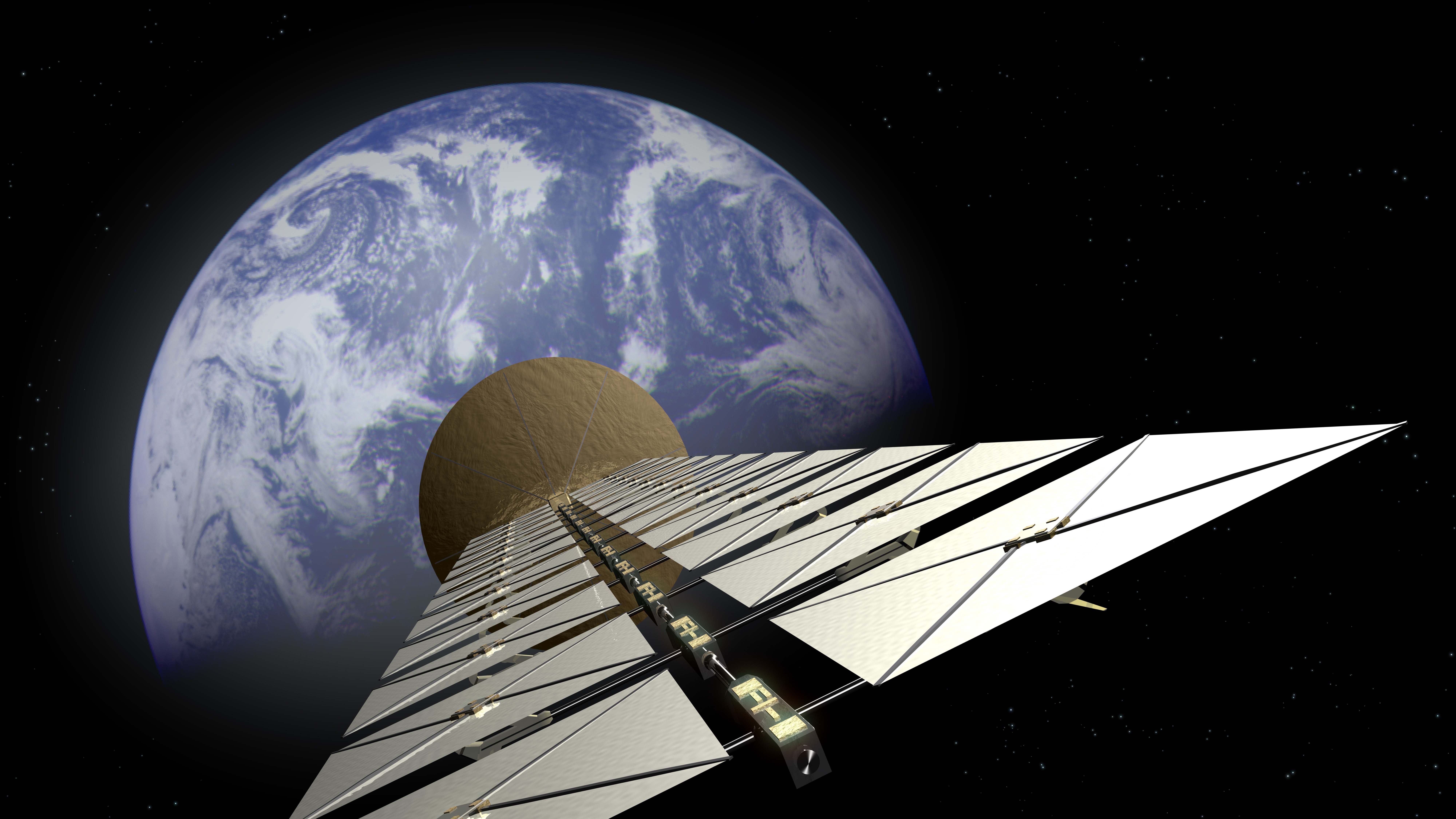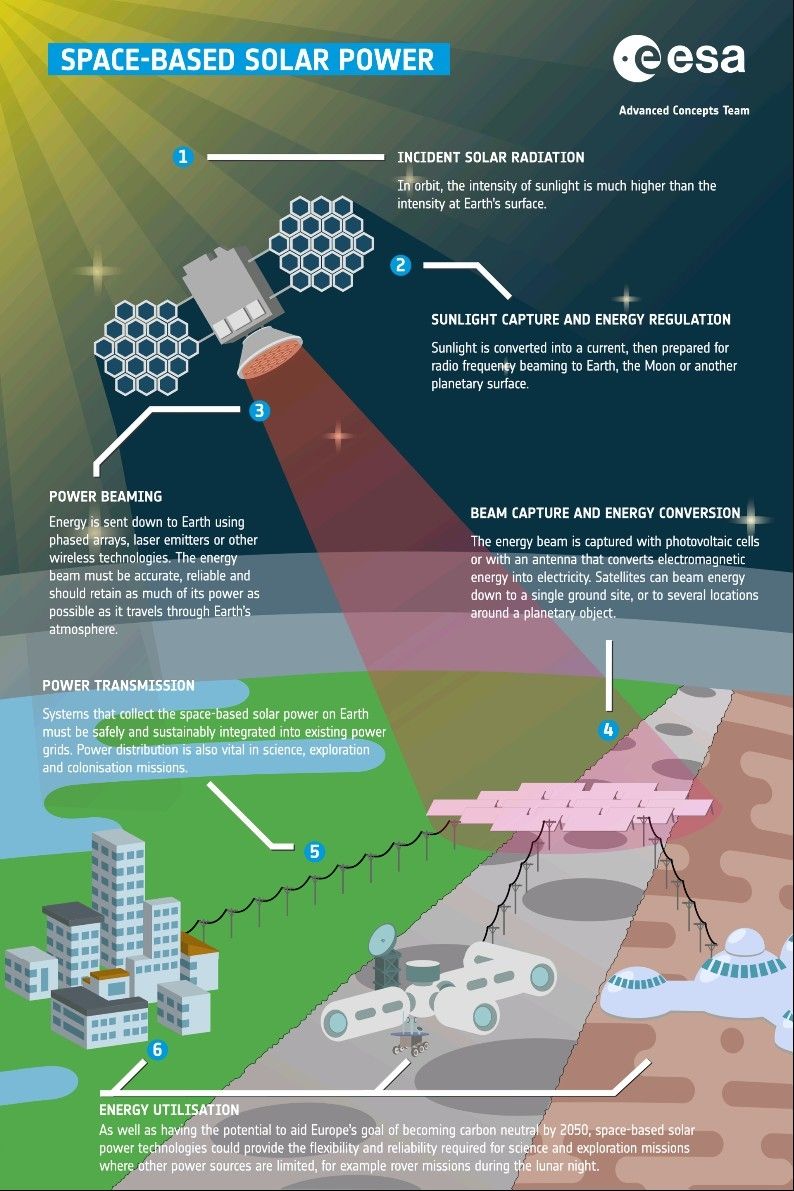Space-based Solar Power for Net Zero
An international workshop to plan ESA’s next steps towards providing clean energy from space for a greener Earth.
Want to know about how space could provide clean energy to society to enable the transition to a Net Zero carbon world by 2050?
Interested to find out what the European Space Agency is doing to see if the idea of collecting energy in space and sending it to Earth is credible and realisable?
Then please join us online on December 9th and 10th, both days from 12:00 to 18:00 pm CET, to meet and hear from international experts in the field and to discuss and learn about the vital role that Space-based Solar Power (SBSP) could play in the fight against climate change and help ESA shape its future programmes.
Registration
Workshop Day 1 Registration https://esait.webex.com/esait/onstage/g.php?MTID=ebd7568e9b6e738834eac723a1ba9ba2a
Workshop Day 2 Registration https://esait.webex.com/esait/onstage/g.php?MTID=ed4a9cdffbab0d992f42d70bb5ebb83ee
Day 1, Thursday December 9th
|
Time (CET) |
Session Title |
Presentation Title |
Presenter |
|
12:00 |
Welcome & Introducing Space-based Solar Power (SBSP) for Net Zero |
ESA Agenda 2025 – Addressing Societal Needs |
Josef Aschbacher, European Space Agency (ESA) |
|
12:15 |
Welcome address and Vision |
Leopold Summerer, European Space Agency (ESA) |
|
|
12:20 |
Energy and the Net Zero Challenge |
Francesco Pavan, International Energy Agency (IEA) |
|
|
12:40 |
International Perspectives on SBSP for Net Zero |
The UK experience - Putting Space Based Solar Power on the pathways to Net Zero |
Martin Soltau, UK Space Energy Initiative |
|
13:10 |
Power Beaming and Space Solar - SBSP Demo |
Paul Jaffe, US Naval Research Laboratory |
|
|
13:40 |
SPS-ALPHA concept, including various systems studies, economic analysis |
John Mankins, Mankins Space Technology, Inc. |
|
|
14:10 |
BREAK |
||
|
14:15 |
International Perspectives on SBSP for Net Zero (cont.) |
Activities of Solar Power Satellite (SPS) development in China |
Hou Xinbin, CAST, China |
|
14:45 |
Efforts to develop a SPS in Japan for the past 10 years |
Koji Tanaka, ISAS/JAXA, Japan |
|
|
15:15 |
The Caltech Space Solar Power Project |
Richard Madonna & Sergio Pellegrino, Caltech University |
|
|
15:45 |
SOLSPACE: Enhancing Global Clean Energy Services Using Orbiting Solar Reflectors |
Colin McInnes, University of Glasgow |
|
|
16:05 |
CASSIOPeiA for Net Zero goals |
Ian Cash, International Electric |
|
|
16:25 |
How can game changing technologies most positively contribute to systems transformation required by climate change? |
Kirsten Dunlop, EIT Climate-KIC |
|
|
16:40 |
The Geopolitics of Energy Transitions |
Morgan D. Bazilian, Payne Institute |
|
|
17:00 |
BREAK |
||
|
17:05 |
Roundtable |
Next steps for SBSP? |
Moderator: James Carpenter (ESA): Panellists: Ali Stickings, Martin Soltau, John Mankins, Ian Cash |
|
18:00 |
End of Day 1 |
|
|
Day 2, Friday December 10th
|
Time (CET) |
Session Title |
Presentation Title |
Presenter |
|
12:00 |
International Perspectives on SBSP for Net Zero (cont.) |
Introducing Next Session |
Angeliki Kapoglou, European Space Agency (ESA) |
|
12:05 |
Concept design for Korean space SPS for Net Zero |
Joon Min Choi, KARI, South Korea |
|
|
12:25 |
Space Solar Power – The Australian Context |
Serdar Baycan, Solar Space Technologies Australia |
|
|
12:45 |
Outcomes of the LSIC Lunar Power Beaming Workshop |
Wesley Fuhrman, Lunar Surface Innovation Consortium (LSIC), John Hopkins University |
|
|
13:00 |
Lunar resource manufactured SPS - how much is feasible? |
Alex Ellery, Carleton University |
|
|
13:15 |
High efficiency III-V based photovoltaic cells for laser power beaming and solar power generation in space |
Henning Helmers, Fraunhofer Institute for Solar Energy Systems ISE |
|
|
13:30 |
The Last Energy Revolution? Power Beaming Promises for Aerospace at large |
Jean-Dominique Coste, Airbus Blue Sky Team |
|
|
13:45 |
Current ESA activities on SBSP |
Advenit Makaya, European Space Agency (ESA) |
|
|
13:55 |
BREAK |
||
|
14:10 |
SBSP Commercialisation & Policy |
Introducing Next Session |
Angeliki Kapoglou, European Space Agency (ESA) |
|
14:15 |
Space Resources Utilisation & Space-based Solar Power |
Bob Lamboray, Luxembourg Space Agency |
|
|
14:25 |
Space-based Solar Power as a Catalyst for Space Development |
Leet Woods & Alex Gilbert, Edison Electric Institute & Colorado School of Mines |
|
|
14:40 |
An economic model for space based solar power |
Phil Metzger, University of Central Florida |
|
|
14:55 |
Space Solar Power Historical Challenges and Evolving Dynamics |
Carie Mullins, Bryce Tech |
|
|
15:10 |
How to Finance Space-Based Solar Power Infrastructure |
Eduardo Pineda & Kevin Barry, Light Bridge Strategic Consulting |
|
|
15:25 |
A US Policy for Space Power |
Steve Wolfe, Beyond Earth Institute |
|
|
15:40 |
Introducing Next Session |
Angeliki Kapoglou, European Space Agency (ESA) |
|
|
15:45 |
Roundtable |
Conducting Cost vs Benefits Analysis of Terrestrial Clean Energy vs Space-based Solar Power |
Moderator: Sanjay Vijendran (ESA) Panellists: Bhavya Lal (NASA HQ), Gaetan Bonhomme (Breakthrough Energy Ventures), Nikolai Khlystov, (World Economic Forum), John Mankins (Mankins Space Technology, Inc.) |
|
16:45 |
BREAK |
||
|
16:55 |
Roundtable |
The next 12 months – ESA Roadmap for SBSP |
ESA SBSP Team |
|
18:00 |
End of Day 2 |
|
|
What is Space-based Solar Power (SBSP)?
Space-based solar power is an emerging technology for electricity generation that could provide a limitless source of continuous clean energy to help power our green future. Like terrestrial solar photovoltaic (PV) technology, it harnesses the power of sunlight and converts it into useable electricity. The difference is that it does this in space and delivers the energy to the ground in a continuous manner due to the 24/7/365 availability of sunlight in space which overcomes the intermittency of terrestrial renewables like wind and terrestrial solar which regularly cannot provide power when the wind is not blowing or the sun is not shining. Currently however, despite the potential benefits of SBSP, relatively little research and development in this technology is being pursued internationally, compared to alternative green energy sources.
What is this “Space-based Solar Power for Net Zero” international workshop about?
Following on from previous ESA studies in the mid-2000’s, ESA believes that it is very timely now for the potential and feasibility of SBSP to be more deeply investigated in order to understand whether or not such a technology could be a realistic new source of clean energy for Europe and the world to help with the transition to Net Zero by 2050. As a first step in this direction, this workshop has the objective to define a roadmap of activities for ESA (with support from industry and international partners) to pursue over the next 12 months which could potentially lead to the initiation of a renewed and substantial European/international effort for the development of SBSP for terrestrial energy needs.
The workshop will bring together key international experts from Europe, the US, Japan, China, South Korea, and Australia to describe the state of the art in SBSP, experts from terrestrial energy generation industries, national policy makers and international energy agencies. Key questions to be discussed include: Why it is timely for Europe to decide on whether it will pursue SBSP? What is holding terrestrial energy providers back from investing in SBSP? And what would be the most useful activities to be spearheaded by ESA in the next 12 months that could by the end of 2022 provide a sufficient basis for Europe to embark on a major SBSP development program.
What other steps is ESA taking to explore whether SBSP has a viable path towards commercialisation and contribution to Europe’s Net Zero goals?
Alongside the aforementioned workshop and on-going ESA-funded early R&D efforts on SBSP, a new ESA ITT is now open for a cost vs. benefits analysis study to evaluate the ‘business case’ for space-based solar power as a potential new source of clean energy for Europe. The results of the study, expected by mid-2022, will also help inform the next steps to be taken by ESA and Europe for this promising new capability that could help us secure a bright and sustainable future for our planet. Deadline to apply for the study is December 22, 2021!
Please plan to join us to learn about the vital role SBSP could have in the fight against climate change and help shape ESA’s future programmes.


